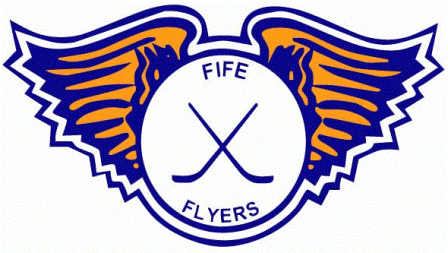FIFE FLYERS
 The Fife Flyers, “featuring some of the most famous players from the teams of Canada, Switzerland and London,” took to the ice for the first time on October 1, 1938.
The Fife Flyers, “featuring some of the most famous players from the teams of Canada, Switzerland and London,” took to the ice for the first time on October 1, 1938.
The team skated out onto the surface of the Kirkcaldy Ice Rink, ready to do battle with the Dundee Tigers. A capacity crowd of 4,265 attended the game, causing a traffic jam in Gallatown and a two-mile tailback of cars, according to the history on the Flyers’ website. Lord Elgin declared the arena open and threw the ceremonial curling stone. And then the game began in earnest – and 75 years later it still goes on today.
The oldest ice hockey team in the United Kingdom, the Flyers celebrated their 75 anniversary this year with a “legends” game in October. Players from the past drew a huge crowd when they played against the current team. Legends indeed: the Flyers boast over 60 Scottish and British cups and titles to their name. But ice hockey in Scotland? Sweden, certainly. North America, for sure – but Scotland? In fact, after Great Britain’s surprising win at the 1936 Olympics in the sport, enthusiasm for the game rapidly spread throughout the United Kingdom, resulting in a number of teams – including the Flyers – forming. Over the years, the sport has experienced its ups and downs, but at this time its longevity seems assured.
“Ice hockey seems to be very popular in certain areas of Scotland,” agrees Daniel Stewart, associate coach of the Flyers club today. “There is a lot of history there and hopefully if teams can find some stability and stay for the long term, then the sport will continue to grow. In Fife, hockey is very popular and although we have a smaller town then most clubs in the league, our fans are as passionate as any.”
Passionate might be putting it mildly. On any given night, 1500 fans will crowd into the arena for the game, but just as often crowds of 2,500 to 3,000 will gather. The rink has a low roof, which means the noise of the cheers echo loudly and for opposing teams it can seem an intimidating venue. “Our fans will let you know when they are not happy, but also when things are good, they are as loud as any,” Stewart affirms.
Stewart believes hockey in Scotland is on the way back up now that four Scottish teams are back on top. He says the success will give the league more exposure and encourage youngsters to join and learn about the sport as well. That said, he acknowledges that within the U.K. hockey will always be a minority sport – but not in Kirkcaldy. “The town loves the sport and with the team being back in the top level, hopefully we can continue to make it grow into something even bigger,” Stewart says. “As for the elite league, I think it is in better shape than it ever has been.”
For those not familiar with the game in Scotland, Stewart says the elite league in the U.K. is probably more similar to the North American style of play than the European. “It has the same kind of physicality and character among players,” he notes. “The difference in play here stems from less depth among the squads and bigger ice surfaces. You tend to have more time on the puck and maybe the game is a bit slower pace as players log a lot more minutes on the ice. So it makes it tougher to be at full energy every shift.”
Originally from the Alberta oil town of Fort McMurray, Stewart comes by his involvement in both Scotland and hockey honestly. His ancestors hailed from the Glenlyon region and his mother was a Kirkland. All of his immediate family right up to his grandparents were born in Canada. Like many a good Canadian, Stewart started skating as soon as he could walk. His father was a hockey player and his two older brothers began the sport at an early age as well. “In Canada, hockey is religion,” Stewart avows. “Almost everyone does it. It is by far the main sport in Canada – similar to how football is in the U.K.”
Love of the sport brought Stewart to Scotland, where he’s been coaching the Flyers for over two and a half seasons. The first season he spent as a player/assistant coach before moving into his current position. “The reward at the end of the day is winning and having success. Hockey is very physical and tough on the body, but all those bumps and bruises feel a bit better after a game when you win and you know the guy beside you battled alongside you.”



















Leave a Comment